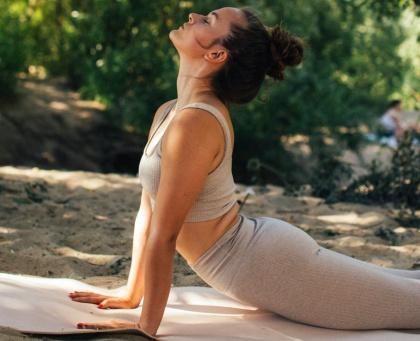Within 12 to 24 hours of stopping smoking, carbon monoxide levels in your blood will drop, and your lung function will improve in a month, notes Dr Pujan Parikh.
Our lungs help us perform an essential life function — to breathe and provide oxygen to body cells.
Needless to say, lungs play an essential part of our respiratory system.
And as you age, the capacity of your lungs and its functionality begins to decline.
If you want to improve your lung capacity, follow these simple tips:
1. Regular exercise and pulmonary rehabilitation
Just like weightlifting improves muscle strength, aerobic exercises help in improving lung function.
As you improve your physical fitness, the body becomes more efficient at getting oxygen into the bloodstream and transporting it to working muscles.
That’s why those who do regular exercise feel less breathless on similar exertion done by a person of the same age group.
Apart from general exercise, specific exercises like diaphragmatic breathing and deep breathing improves lung capacity.
Patients suffering from COPD (Chronic Obstructive Pulmonary Disease), lung fibrosis should undergo pulmonary rehabilitation to keep lung functions at optimum level.
In chronic lung disease patients, improved lung capacity of even 100 to 200 ml via pulmonary rehabilitation can reduce severe pneumonia infection.
2. Stop/reduce active and passive smoking
Smoking is linked to an increased risk of COPD and lung cancer.
It reduces ciliary motility (small hair-like structure on the surface of airways) which is important for mucus and bacteria clearing.
The impaired ciliary function increases the risk of infection.
Passive smoking is also harmful.
Within 12 to 24 hours of stopping smoking, carbon monoxide levels in your blood will drop, and your lung function will improve in a month.
The risk of lung, bladder and oral cancer will also reduce significantly after you quit smoking.
3. Regular vaccination
As COVID vaccination is mandatory for travel and entry at most hotels, restaurants, and cinema halls, most people are vaccinated.
Apart from this, the annual flu vaccine is also important as it reduces the risk of severe infections.
Pneumococcus is the most common cause of community-acquired pneumonia. Pneumococcal vaccine is also recommended for the elderly and patients suffering from chronic respiratory illnesses in particular.
4. Prevent exposure to indoor air pollution
Passive smoking, certain chemicals like mosquito repellants, particulates like dust, live sources like mold, and dust mites are common indoor pollutants and allergens.
Burning a single mosquito coil in a closed room equals exposure to smoking 100 cigarettes.
Burning mosquito coils can cause cough, throat irritation, and wheezing. It may also serve as a risk factor for the development of lung cancer.
Wood burning stoves are the common cause of indoor pollutants causing COPD (very common in Indian villages).
Ozone generators are sold as air cleaners; high ozone levels cause cough, chest discomfort, throat irritation, and breathlessness.
Long-term exposure to nitrogen oxide, a pollutant from using natural gas causes COPD.
5. Prevent exposure to outdoor air pollution
There is no single air pollutant that is responsible for all adverse effects.
Particulate matter (PM), ozone, sulfur dioxide, and nitrogen oxide are some of the common outdoor pollutants.
PM has many components like sulfates, nitrates, ammonia, and mineral dust.
PM less than 2.5 micron can enter the bloodstream and PM less than 10 microns lodges deep inside the lungs.
These pollutants irritate the airways causing cough, shortness of breath and wheezing.
Long-term exposure to outdoor pollutants causes chronic bronchitis, asthma, and heart disease, decreases life expectancy, increases the risk of lung cancer, and impairs lung growth in children.
Outdoor exercise should be avoided when the pollution level is high.
6. Regular health check-ups and pulmonary function test
Uncontrolled diabetes, patients requiring dialysis or suffering from liver dysfunction are at increased risk of pneumonia, and TB.
Regular health checkup is required to keep a close tab on these components.
Patients with respiratory illness should regularly do pulmonary function tests and consult doctors to keep lung function at optimum level.
Patients with COPD, lung fibrosis (including those on steroids) are at increased risk of pneumonia.
7. Maintain hand hygiene and oral health
In immunocompromised patients and elderly people, a simple cold or other respiratory infection can sometimes become very serious.
Hand washing with soap and water or using alcohol-based cleaner reduces the risk of respiratory infection by 25%.
Proper handwashing prevents the spread of flu by removing viruses that get onto hands from coughing and sneezing.
Poor oral health also increases the risk of pneumonia.
8. Wear a mask
We have understood the importance of wearing a mask during the COVID 19 pandemic.
Using an N95 or a simple surgical mask also significantly reduces the risk of respiratory infections.
9. Watch your posture
Good posture is important to maintain optimum lung capacity.
Slumped, poor posture, and lumbar lordosis weakens muscles in the upper body, restricts breathing and impacts lung capacity.
Regular exercise also helps to improve posture and optimises lung functioning.
10. Use Regular inhaler
Uncontrolled COPD, asthma is linked to poor outcomes in pneumonia patients and increases the risk of respiratory infection.
Asthmatic and COPD patients should take regular inhaler therapy as suggested by the doctor.
Dr Pujan Parikh is consultant pulmonary medicine, Sir HN Reliance Foundation Hospital, Mumbai.
Disclaimer: All content and media herein is written and published online for informational purposes only. It is not a substitute for professional medical advice. It should not be relied on as your only source for advice.
Please always seek the guidance of your doctor or a qualified health professional with any questions you may have regarding your health or a medical condition. Do not ever disregard the advice of a medical professional, or delay in seeking it because of something you have read herein.
If you believe you may have a medical or mental health emergency, please call your doctor, go to the nearest hospital, or call emergency services or emergency helplines immediately. If you choose to rely on any information provided herein, you do so solely at your own risk.
Opinions expressed herein cannot necessarily provide advice to fit the exact specifics of the issues of the person requesting advice.
Source: Read Full Article


